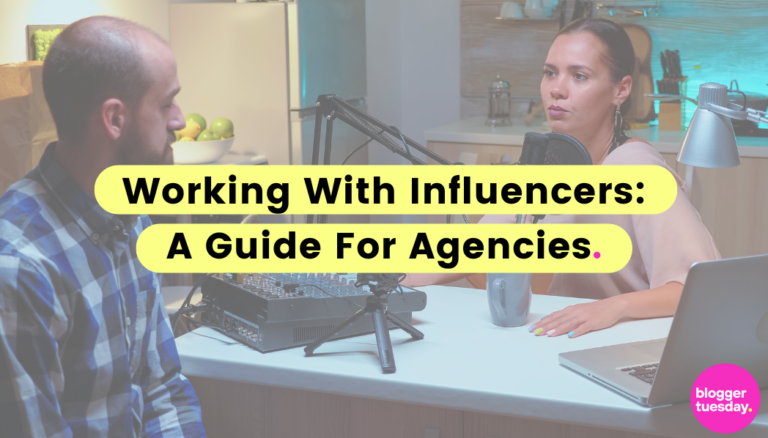Cutting through the competition in today’s digital landscape has never been more challenging, especially for small, growing brands. Because of this, it is critical for agencies to identify and use all tools available to design custom marketing campaigns and help their clients succeed. Among these tools is influencer marketing.
When used properly, influencer marketing can help brands establish long-lasting relationships, elevate their reputation, and expand their reach. Beyond brand image, influencer marketing also plays a role in improving conversion rates and, in turn, profits.
In this guide, we’ll cover everything you need to know to use influencer marketing with confidence.
Influencer Marketing: Key Concepts
At its core, influencer marketing involves partnering with individuals who have significant social media followings to promote products or services. Influencers build trust and engagement through authentic content, making them powerful allies in a brand’s marketing strategy.
Influencer marketing helps new and established brands leverage the influencer’s credibility and reach. It allows companies to deliver a brand message – be it a product launch or promotion – to a larger audience.
This strategy can be used for a wide range of purposes, including:
- Product Launches: It helps generate excitement around new offerings.
- Brand Awareness: It allows growing brands to reach new, broader audiences.
- Content Creation: it allows both brands and influencers to create authentic content that resonates with their audiences.
- Customer Trust: Through collaborations, brands can build credibility by associating themselves with respected individuals or industry leaders.
- Engagement: It drives higher interaction rates with the target audience.
Types of Influencer Marketing
Influencers have diversified into a range of types and specialties. Selecting the right type depends on your brand’s goals, budget, and audience. Some types of influencer marketing include:
- Mega-Influencers: Celebrities with millions of followers, ideal for mass reach.
- Macro-Influencers: Individuals with 100K-1M followers are great for high visibility.
- Micro-Influencers: 10K-100K followers offer high engagement in niche markets.
- Industry Experts: High authority in specific fields, useful for credibility and targeting specific niches.
Each type offers unique benefits and can be strategically used based on campaign objectives. It is also important to keep an eye on recent developments and trends. For example, nano-influencers are today playing a major role. These have fewer than 10K followers, and they are perfect for tight-knit, community-driven campaigns.
Benefits of Working with Influencers For Brands
Collaborating with influencers offers endless benefits to agencies and brands alike. On one side, these collaborations can lead to long-lasting relationships, which can boost the reputation of your agency and help you secure more clients. On the other hand, clients can leverage an unparalleled level of reach and the pristine reputation of influencers to boost credibility and sales.
Additionally, influencer marketing can be a cost-effective marketing strategy for both agencies and brands, leading to significant ROI and long-lasting effects.
Below, we’ll look at some of the main benefits of influencer marketing:
Increased Brand Awareness
Partnering with influencers significantly boosts visibility and reach. Simply put, when influencers share a certain product or message, they introduce your brand to their extensive follower base.
This organic exposure is often more impactful than traditional advertisements, as it comes from a trusted source. Additionally, influencers will know how to craft content that resonates with their audience, meaning that a certain product or service will be well-integrated into high-quality content that drives engagement.
For agencies looking to leverage influencer marketing to increase brand awareness, it is important to understand when it’s right to use this strategy. Influencers are excellent for product endorsements, to highlight new or existing products. You may also plan for social media takeovers allowing influencers to run your brand’s social media for a day. Lastly, sponsored posts are an easy way to promote specific campaigns or initiatives.
Higher Engagement Rates
Influencers excel at creating content that captures and maintains their followers’ attention. This leads to much higher levels of engagement rates compared to traditional ads, which are crucial for social media algorithms that reward interactive posts.
This level of increased engagement not only boosts visibility but also encourages a stronger connection with your audience.
For even higher engagement, consider implementing interactive content like quizzes, polls, and Q&A sessions. You can also encourage user-generated content or conduct live streams to boost real-time interaction with followers.
Enhanced Consumer Trust
Consumers often perceive influencers as more relatable and trustworthy than brands. And, they are more willing to engage with content that resonates with their value, compared to standalone ads!
Because of this, collaborating with an influencer can transfer this trust to a brand, making potential customers more likely to purchase its products.
For agencies, it is important to keep in mind that trust is especially critical for new brands or product launches – here’s where influencers can help most! They offer a range of benefits that boost trust, including:
- Authentic reviews
- Behind-the-scenes content for transparency
- Narrative storytelling relates personal stories
- Inserting a product or brand into valuable content, organically
5 Strategies to Choose The Right Influencers to Collaborate With
Selecting the right influencers is crucial for your campaign’s success. Key strategies to pinpoint the right influencers for your clients to work with include:
- Align with Brand Values: Ensure the influencer’s values match the brand’s value proposition to ensure their content resonates with both audiences. To assess their values, you could evaluate their posts, lifestyle, and past collaborations to see if they align with your client’s brand principles.
- Analyse Their Audience: make sure that the influencer’s followers match your client’s target demographic. Consider different aspects, including age, location, interests, and engagement rates. You can also use audience insights tools to verify if their followers would be interested in your products or services. This ensures your content reaches the right people and that you are not wasting money on an inefficient campaign.
- Track Past Performance and Reputation: when choosing to work with an influencer, your client’s brand will be linked to that influencer. Because of this, it is critical to review the influencer’s previous campaigns to gauge reliability and effectiveness, as well as their reputation within the community. If they suffer a scandal, your client’s brand may be paying the consequences of this pitfall! Reliable influencers will have a history of professionalism and successful collaborations.
- Consider Your Budget and Negotiate Terms: Without clear boundaries, influencer marketing can get expensive! So, be sure to define what you can afford and find influencers within that range. Negotiate terms that align with your campaign goals, and be sure to discuss deliverables, timelines, and payments in a transparent way.
- Set Clear Goals: Last but not least, be sure to establish clear objectives for your collaboration, such as specific KPIs about brand awareness, sales, or engagement. Define and share these goals with all parties involved, as this level of collaboration will help measure success and guide the influencer’s content creation.


